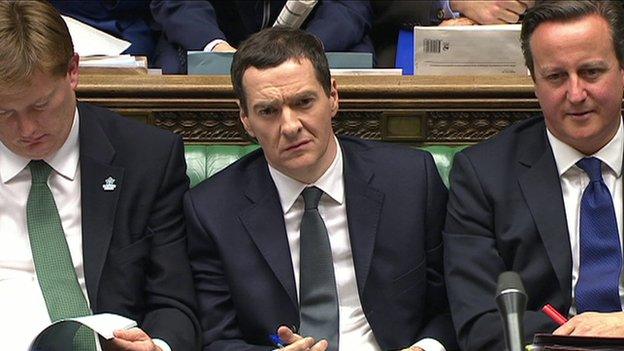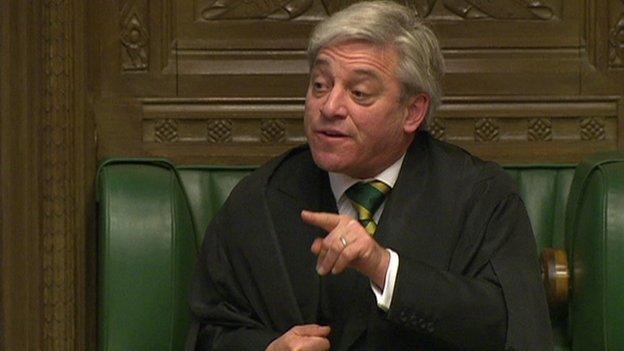Autumn Statement: Ed Balls says Osborne's targets 'in tatters'
- Published
Ed Balls MP: "Every target missed, every test failed, every promise broken"
Chancellor George Osborne's promise to balance the nation's books in this parliament is "in tatters", shadow chancellor Ed Balls has claimed.
He said Mr Osborne has forecast to borrow £219bn more than planned, as he responded to the Autumn Statement.
"Every target missed, every test failed, every promise broken," he told MPs, arguing that people were £1,600 a year worse off as a result.
George Osborne said he had steered the economy from crisis to stability.
Mr Balls had "no answers" to the economic challenges the country faces, he said. "He has no credibility, no workable policies, because he has got not plan."
A future Labour government would take Britain back to square one, he told the Commons.
In his Autumn Statement, Mr Osborne said that although borrowing was set to be £91.3bn this year - above the forecast £87bn - the longer term outlook was rosy, with the UK "out of the red and into the black" by 2019/20.
Government borrowing is forecast to be £91.3bn this year, then £75.9bn, MPs were told.
"The deficit is falling this year and every year," Mr Osborne said.
'Every target missed'
However, responding to the chancellor's fiscal statement in the Commons, Mr Balls claimed Mr Osborne had not been straight about the figures.
Citing the latest economic statistics from the independent Office for Budget Responsibility, he told MPs that borrowing has been revised up by £4.9bn this year, and by £7.6bn in 2015.
"Over two years he's revised up borrowing by £12.5bn... this means the chancellor will have borrowed in this parliament £219bn more than he planned in 2010," he said.
"It's all here in black and white."
The shadow chancellor also stressed that growth was being revised down in each of the years from 2016-18, according to the latest forecasts.
"We all know he's changed the way he styles his hair but he can't brush away the facts," Mr Balls remarked.

George Osborne, flanked by the PM and his Lib Dem deputy in the Treasury, listens to Ed Balls' response
He said stagnating wages had squeezed living standards and had led to a fall in tax receipts, with people on average £1,600 a year worse off.
"He promised to make people better off. Working people are worse off. He promised we were all in this together. Then he cut taxes for millionaires," he said.
"Every target missed, every test failed, every promise broken."
Labour would deliver an economic recovery "for the many, not just a few", and balance the nation's finances in a fairer way, he said.
Balancing the books would only work if it puts "good jobs, rising living standards and stronger growth at its heart", he added.
'Sticking plasters'
In the Autumn Statement George Osborne announced reforms to the residential property stamp duty, effective from midnight - which was welcomed by Labour.
It means the current system, where the amount owed jumps at each threshold level, will be replaced by a graduated rate, working in a similar way to income tax.

Commons Speaker John Bercow castigated several Tory MPs as he called for quiet during Ed Ball's speech
Mr Balls said the chancellor had "accepted" that high value properties were "under-taxed" and told him to "have the courage of his convictions" and match Labour's commitment for a mansion tax to fund more NHS nurses and GPs.
"Our national health service deserves a proper, funded long-term plan, not just more short-term sticking plasters," he argued.
The government has pledged an extra £2bn for frontline health services across the UK, describing it as a "down payment" on a plan drawn up by NHS bosses which called for an extra £8bn a year above inflation by 2020. Labour has said it would commit an extra £2.5bn a year above Mr Osborne's plan.
Other measures welcomed by Mr Balls included the scrapping of Air Passenger Duty for under-12s from 1 May 2015, and under-16s in 2016; an increase in the research and development tax credit for small and medium-sized (SMEs) firms, and a review of business rates.
However, Mr Balls called on the government to go further and introduce an immediate cut in business rates for small companies, and for control of revenue from a growth in business rates to be devolved to all city and council regions.
He also called for an increase in the bank levy to pay for more free childcare for working people, rises in the National Minimum Wage and a bankers' bonus tax to fund jobs for young people.